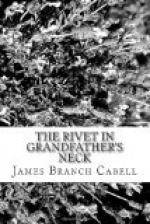He spoke with quaint wistfulness. The colonel sat regarding him in silence, with shocked, disapproving eyes. Then Charteris cocked his head to one side and grinned like a hobgoblin.
“What wouldn’t you give,” he demanded, “to know what I am really thinking of at this very moment while I talk so calmly? Well, you will never know. And for the rest, you are at liberty to use your all-important documents as you may elect. I am John Charteris; whatever man begot my body, he is rotten bones to-day, and it is as such I value him. I was never anybody’s son—or friend or brother or lover,—but just a pen that someone far bigger and far nobler than John Charteris writes with occasionally. Whereas you—but, oh, you are funny, Rudolph!” And then, “Good-night, dear brother,” Charteris added, sweetly, as he left the room.
* * * * *
And Rudolph Musgrave could not quite believe in the actuality of what had just happened. In common with most of us, he got his general notions concerning the laws of life from reading fiction; and here was the material for a Renaissance tragedy wasted so far as any denouement went. Destiny, once more, was hardly rising to the possibilities of the situation. The weapon chance had forged had failed Rudolph Musgrave utterly; and, indeed, he wondered now how he could ever have esteemed it formidable. Jack was his half-brother. In noveldom or in a melodrama this discovery would have transformed their mutual dealings; but as a workaday world’s fact, Musgrave would not honestly say that it had in any way affected his feelings toward Jack, and it appeared to have left Charteris equally unaltered.
“I am not sure, though. We can only guess where Jack is concerned. He goes his own way always, tricky and furtive and lonelier than any other human being I have ever known. It is loneliness that looks out of his eyes, really, even when he is mocking and sneering,” the colonel meditated.
Then he sighed and went back to the tabulation of his lists of wills.
V
The day was growing strong in the maple-grove behind Matocton. As yet, the climbing sun fired only the topmost branches, and flooded them with a tempered radiance through which birds plunged and shrilled vague rumors to one another. Beneath, a green twilight lingered—twilight which held a gem-like glow, chill and lucent and steady as that of an emerald. Vagrant little puffs of wind bustled among the leaves, with a thin pretense of purpose, and then lapsed, and merged in the large, ambiguous whispering which went stealthily about the grove.
Rudolph Musgrave sat on a stone beside the road that winds through the woods toward the railway station, and smoked, nervously. He was disheartened of the business of living, and, absurdly enough, as it seemed to him, he was hungry.




